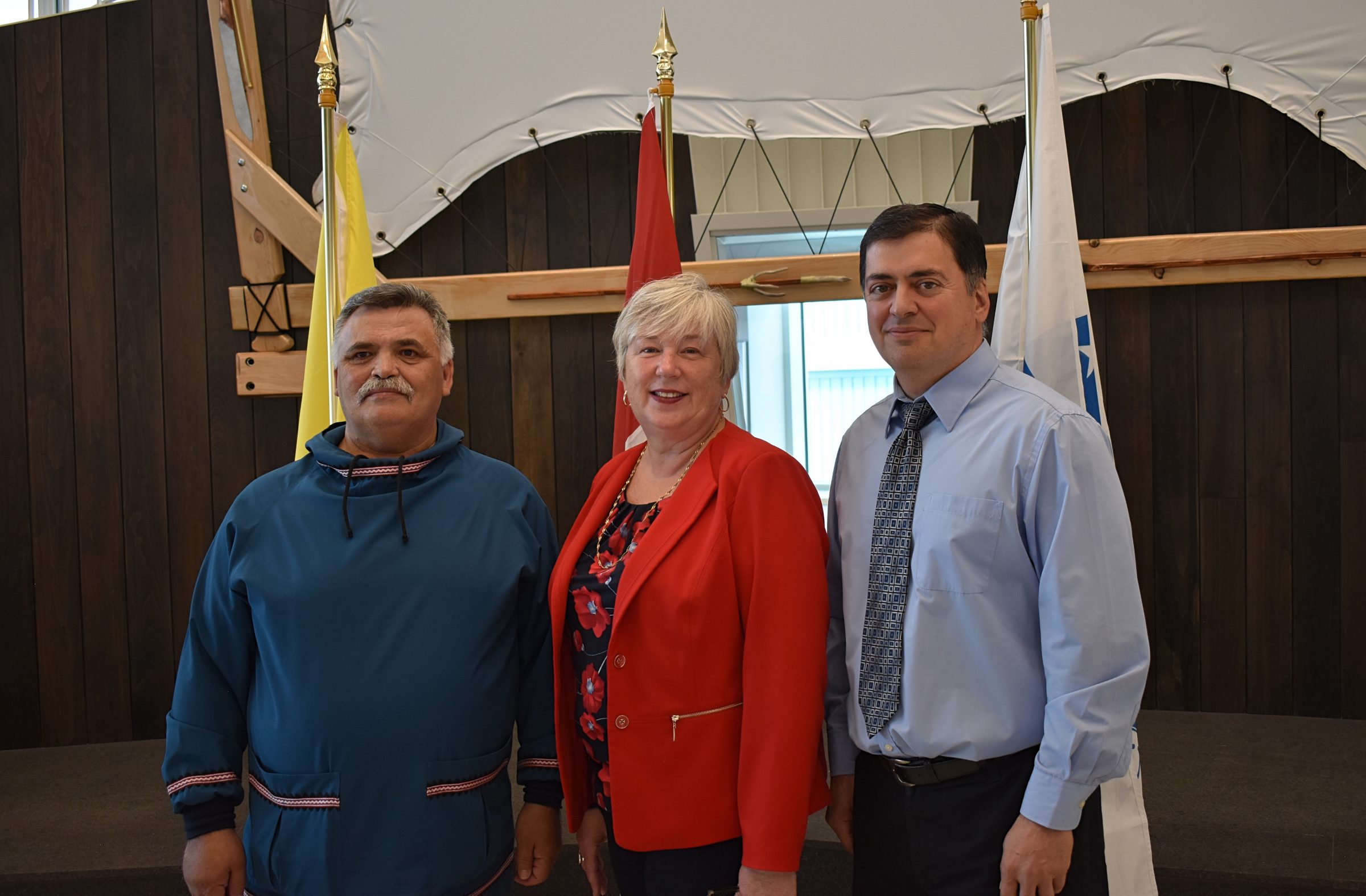Canada commits to connecting Iqaluit to fibre optic internet
Feds will contribute $151 million to lay undersea cable across Davis Strait
The federal government announced today at Iqaluit’s Nunavut Arctic College that it would spend $151 million to run a fibre optic cable across the Davis Strait to bring faster, more affordable internet to Iqaluit and Kimmirut. From left: Lorne Kusugak, Nunavut’s minister of community and government services; Bernadette Jordan, the federal minister of rural economic development; and Qulliq Energy Corp. President and CEO Bruno Pereira. (Photo by Kahlan Miron)
The Canadian government has committed to spending $151 million to bring cheaper, faster high-speed internet to Nunavut’s capital.
Bernadette Jordan, the federal minister of rural economic development, made the announcement today in Iqaluit with Lorne Kusugak, Nunavut’s minister of community and government services.
The project will involve laying 1,700 kilometres of fibre optic cable from Nuuk, Greenland, across the Davis Strait to Iqaluit. From there, a branch will extend to Kimmirut.
The cable will run off from an existing fibre optic link between Greenland and Newfoundland.
Residents can expect internet speeds of up to one gigabit per second. Improved services will also be available to schools, businesses, health facilities and government facilities.
Nunavut’s other communities should also benefit from having greater satellite bandwidth available to them, with Iqaluit and Kimmirut no longer depending on satellite service.
The Government of Nunavut will design and execute the project, said Kusugak at the announcement. The project should be completed by 2023, with the design plan finalized in 2021 and cable installed by 2022.
“The Government of Nunavut is committed to closing the digital gap that separates our territory,” said Kusugak in a news release.
The Government of Nunavut has already committed $30 million to the project. Last year, Nunavut’s MLAs debated the merits of the fibre link, and John Main, MLA for Arviat North–Whale Cove, made a failed effort to have the project pulled from the territorial budget.
The federal funds come from the rural and northern communities infrastructure stream of the Investing in Canada Plan.
“Once complete, Nunavut will no longer be the only region in Canada that relies on satellite internet for broadband,” said Jordan at the announcement.
Jordan also mentioned a previously announced funding commitment of $20.5 million towards Kugluktuk’s new solar and diesel power plant, which is jointly funded by the Qulliq Energy Corp. The Government of Canada’s funding for this project also comes from the Investing in Canada Plan, this time under the Arctic Energy Fund, which supports energy security in northern communities.





So how come this story does not have The cabling will be owned by the Government of Nunavut and internet will be doled out to Iqaluit and Kimmirut households has yet to be determined. its in the other article?
I would rather have the link owned by the GN than by a private sector firm like NWTel. Because it is a fibre-optic hard line there is no limit to the capacity that can be carried on it so once the GN has identified a preferred carrier there will be an announcement as to how all residents can access it. It may also force NWTel to get more competitive with their internet pricing options for Iqaluit and Kimmirut at least.
Multiple providers will be able to do this, they will just need GN approval to be able to do business in Nunavut. Bell and Rogers will be able to get into providing here. And like you said, if NWTel wants in on it then they will have to be competitive. Or they can just abandon the Iqaluit/Kimmiurt market and focus solely on the other communities as there will little to no competition.
Side Note: NWTel is owned by Bell
Maybe because the fibre is coming from Greenland and it is owned by the government in Greenland? I agree, I would rather have the GN own this instead of northwestel.
As a Westerner, I am envious of the East in this regard, but also happy that Inuit will be able to enjoy fiber-optic internet. This is a game changer in all aspects of life in Nunavut; healthcare, education, and in my heart – online gaming (eSports). Congrats Inuks, maybe one day Cambridge Bay will get connected.
Thank you Westerner. I am glad that online gaming will FINALLY be available with little to no lag. It is a decade too late to start my eSport career but now I can occasionally play online in 2022.
And I hope it happens out west later on in the future as well.
Don’t lose hope, there’s good news for you too.
With Iqaluit getting Fiber internet, it will free up a bunch of Satellite Bandwidth for the rest of the territory. So you should see your internet speed increase significantly anyways 🙂
Thanks for that I guess Unik, but download speeds don’t affect the ping necessary for online gaming. Even with all of Iqaluit and Kimmirut switching, my ping will remain the same at around 650 ms.
“Once complete, Nunavut will no longer be the only region in Canada that relies on satellite internet for broadband,” said Jordan at the announcement.
Not true there are many places in rural Canada that rely on Xplorenet services because there is no DSL or cable internet. If you live on a farm or in any of the First Nations here on the flatlands you probably have to rely on service so slow that it makes you want to get out and push.
Pretty sure they meant Region/Territory.
This story seems to be repeating and appears in at least two other locations. I thought my comments had been deleted. Very confusing Mr. Editor. Maybe embed links to similar articles (Like CBC does)